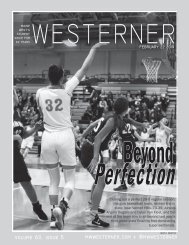You also want an ePaper? Increase the reach of your titles
YUMPU automatically turns print PDFs into web optimized ePapers that Google loves.
12 opinions/westerner
Renew
the
Future
Dragging our heavily laden garbage cans to the curbside
each week, we look to the city to dispose of our waste in
some quiet location where we can safely forget all about
it. We produce an impressive amount of trash and do an
impressive job of taking zero responsibility for the consequences
of it.
In fact, we are so skilled at producing waste that, according
to the Environmental Protection Agency, the United
States produced 267.8 million tons of trash in 2017.
That’s an average of 1,636 pounds of trash created by
each one of us in one year.
1,636 pounds of trash made by you.
1,636 pounds of trash made by me.
Though we want to curb our waste
production, it isn’t an easy task as most
products are designed to be used once
and thrown away, producing a never
ending stream of garbage. It nearly
XIAO LIN HE
BY PRATIKSHA
BHATTACHARYYA
colunnist
seems impossible to live completely
waste-free when there is so much to
throw away.
Yet we can say goodbye to singleuse
drink bottles and caps, plastic silverware,
plastic bags and straws, and single-use soap bottles.
In general, choosing non-plastic, renewable materials
can greatly reduce the amount of waste we create. Buying
clothes made from bamboo or recycled water bottles would
also help extend the life of our planet.
Much of our national waste also comes from packaging
materials. We click to order products from online companies,
and when they arrive, we dig through layers of cardboard,
bubble wrap and styrofoam. After we’ve unwrapped
our packages and popped all the bubbles in the wrap, we
throw it out with little thought on where it ends up.
While we complacently go on with our lives, this waste
often finds its way into our oceans, rivers, forests, and soil.
In order to combat this ridiculous amount of trash,
though, many have started advocating for zero-waste living.
The idea is to replace plastics and synthetics with plant
based products and other compostable materials. In one
viral challenge, people are trying to limit a year’s worth of
waste into what can fit into a 16 oz glass jar. While this may
seem like a drastic change, it’s not as hard as it seems. You
may not opt for collecting your trash in a glass jar, but we
can all try to eliminate the use of single-use plastics.
Looking at the way global warming and pollution has
progressed, we are long-past the time to start living renewably.
Though we may have to rethink our daily choices,
moving in the direction of renewable resources and natural
based products is the first step to healing our wounded
planet.
way with Words
Since we were young, our parents have
ingrained one rule into our minds:
‘The Golden Rule.’ Do to others as you
would have them do to you.
This phrase seems effortless; after all, we
know that if we desire respect, we must give
respect to others. If we desire to be treated
kindly, we must also treat others
kindly. As easy as it may seem to
commit to this way of life, this
saying is easily comprehended yet
quickly disregarded.
Within this motto, one word
stands out: “do.” Though it appears
to be an insignificant word, it fills
the phrase with power. It creates a
call to action. Have you ever heard
the phrase, “Think about others as
you would have them think about
you”? Perhaps, “Feel something
about others as you would have them feel
something about you”? Unsurprisingly, neither
of these phrases has caught on because
they don’t focus on action.
“Do,” however, implies action. Not just
any action either, but an action that directly
follows our words.
Imagine that you are invited to be the best
man or maid of
honor at your
best friend’s wedding.
You watch
as the happy
couple vows to
be faithful to
each other, to
stand by one another
in sickness
and in health.
But, only a few hours into the reception, you
see the groom with another woman, not his
bride. All of a sudden, his promises have become
empty. The words he spoke just hours
before, now mean nothing when his actions
speak for themselves. He spoke of faithfulness,
but evidently, he didn’t even intend to
be faithful. Though this is an obvious exaggeration,
it provides a visual of the uselessness
of words without action to solidify them.
Evidently, the divergence between what
we claim to care about and what we actually
care about can be staggering. Many times,
our actions reflect our truer values. Noam
Shpancer, Ph.D, of Psychology Today writes,
“If you want to know what you like, believe
in, and find important, then look at your
behavior. You may surprise yourself. Often,
what we tell ourselves we value is not what our
actions bespeak. When you see a gap between
your words (or thoughts) and your actions,
trust the actions, not the words.”
february 14, 2020
“ACTIONS SPEAK LOUDER THAN WORDS,
BUT NOT NEARLY AS OFTEN.” — MARK TWAIN
BY JENNA
DAUBE
asst. opinions
editor
We say one thing then do another. And,
perhaps unfortunately, our actions speak the
truth. This idea can connect to a surplus of
circumstances we face daily, for example, relationships.
Let’s say you and your friends decided
to grab some food at Brandy’s. While eating,
most of you converse and enjoy
each other’s company. All except for
one friend, who keeps their eyes fixed
on their phone throughout the entirety
of the meal. You can clearly see the two
types of people in this scenario. Based
on their behaviors alone, you could tell
who wanted to be there and who never
intended to socialize.
Take this a step further, and look
at religion. Often times politicians or
other leaders will pull quotes from the
Bible to further elevate their argument.
Perhaps they mention that James 1:19 says,
“Be swift to listen, slow to speak, and slow to
get angry.” This politician, who claims to be a
Christian, ridicules his competition, ranting
about how they should control themselves
and listen to the needs of the public. However,
as soon as the politician finishes his tangent,
he treats his assistants rudely, swears at the
“If you want to know what you like,
believe in, and find important,
then look at your behavior. Often,
what we tell ourselves we value is
not what our actions bespeak.”
— Dr. Noam Shpancer
intern who didn’t
bring his coffee,
and storms out of
the room. This exemplifies
two major
issues. First of
all, if you haven’t
figured it out, the
angry politician is
the hypocrite. Not
only did he take
Christianity out of context, but he directly
contradicted his previous statement.
And, unfortunately, it isn’t only Christians
who can be hypocrites. Many so-called religious
people hypocritically twist scriptures for
their own purposes, and the disconnect between
their words and their range of policies
and actions tells you everything you need to
know.
Shpancer emphasizes that “to understand
the true goal of a certain action, look at the
actual outcome. Quite often, you can discern
where someone truly wants to be by looking
at where they keep ending up.”
If you wonder whether or not you are being
consistent as a person, evaluate the things
you do. You may realize you haven’t been the
person you desire to be. By far, the most difficult
part of becoming a better person is facing
your flaws. If we can take this simple step,
then we can reap the benefits of being our
better selves.

















